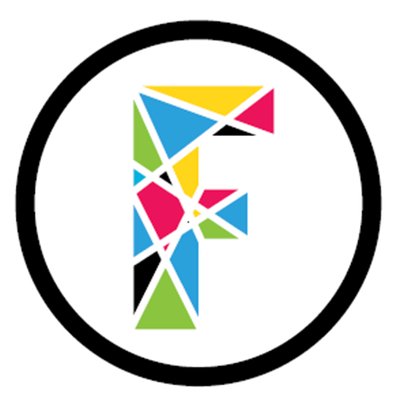
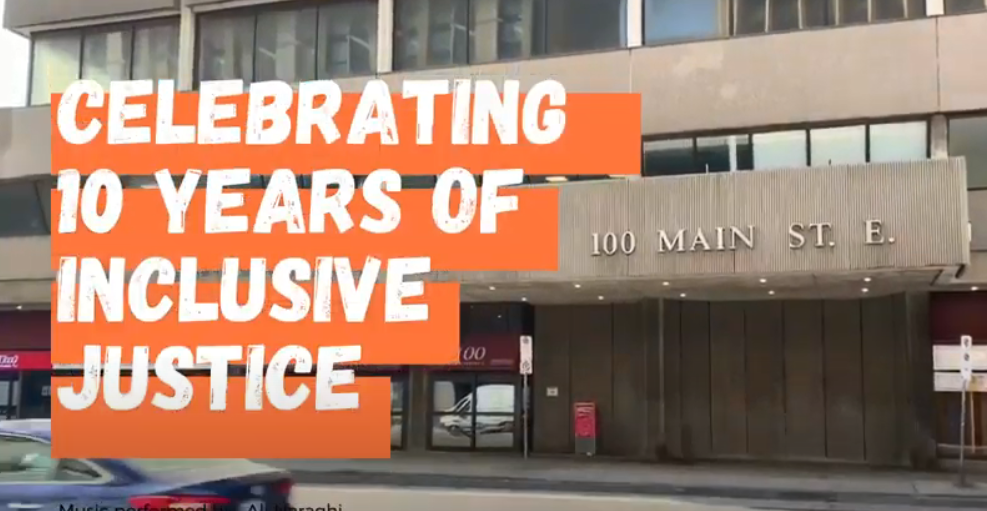
On April 1st, 2010, the Hamilton Community Legal Clinic first began its operations after amalgamating three longtime legal clinics. We are proud to say that it has been 10 years since we began serving Hamilton as one, unified clinic. Our services aim to reach populations that have been disproportionately ignored and mistreated by our legal system. Today, we are proud to say we have built relationships with many of these communities to deliver services and advocate for systemic change. We have done this by working within and with these communities. We achieve positive changes and strengthen our community by promoting inclusive justice for vulnerable Hamilton residents.
We had initially thought of holding a free community dinner to thank and honour our community and partners through music, dance and laughter and to celebrate 10 years of inclusive justice.
Although “celebrations” aren’t appropriate or indeed possible in these difficult times, we do wish to celebrate our commitment and actions to achieve inclusive justice. We also look forward to when we can celebrate together, by breaking bread and honouring each other and our stories and will do so as soon as it is safe to gather.
Take a look at our 10th Anniversary video!

The Hamilton Francophone Centre and the festival’s organizing committee invite you to FrancoFEST 2020, a summer event celebrating the Francophone community which takes place in a new innovative format. This live event showcasing talent and entertainment will surprise you, delight you, but most of all, it will bring you together to share a special moment grounded in arts and community. The Hamilton Community Legal Clinic is proud to be a partner of FrancoFEST 2020.
This event will take place on Friday June 19, 2020, from 6pm-8pm on multiple online platforms.
For more information, visit: https://www.facebook.com/events/565339331080876
The Hamilton Francophone centre is also hosting yoga sessions in French every Wednesday from 12pm to 12:45pm.
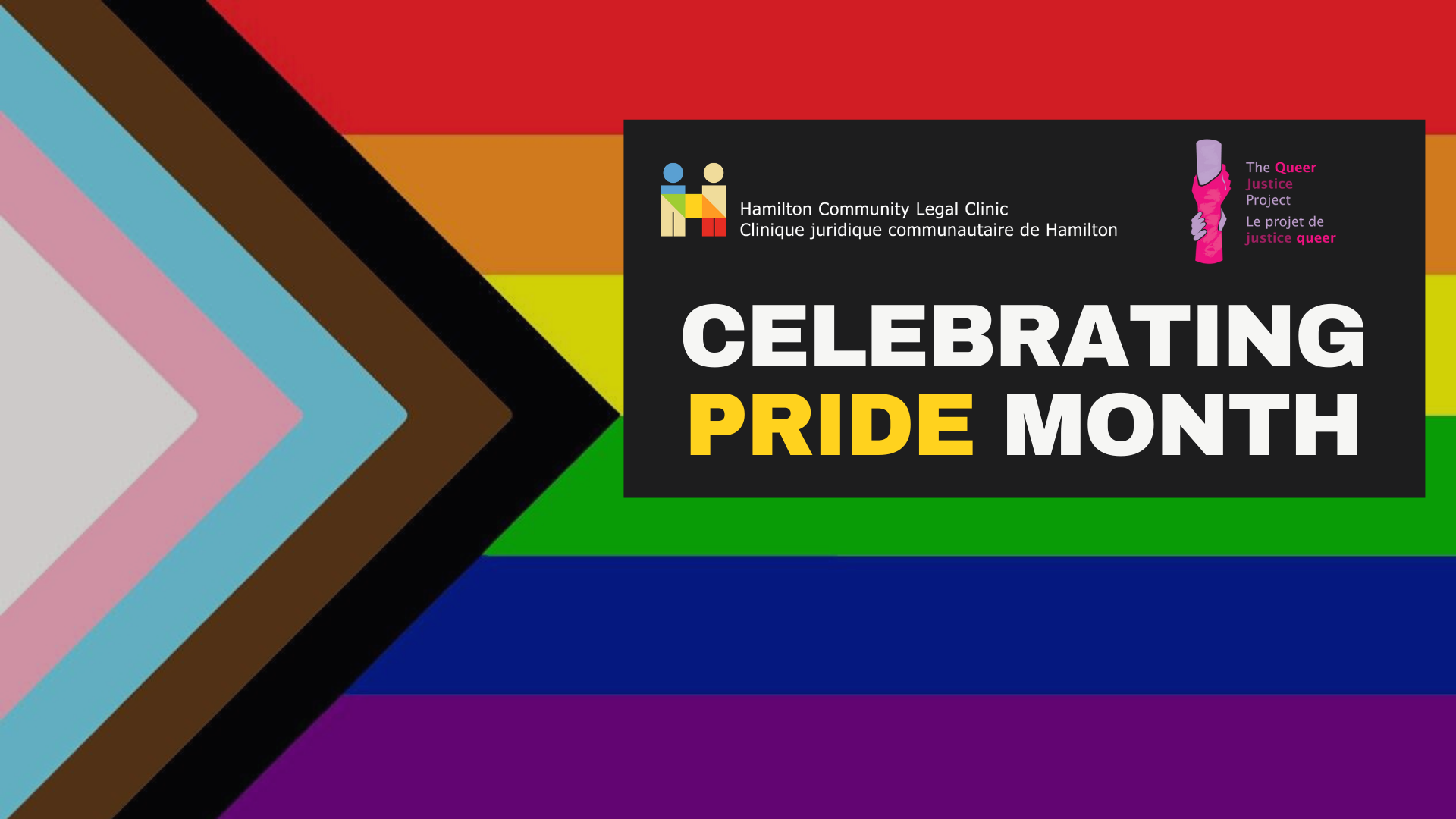
Note: The Queer Justice Project recognizes that language is important. In an effort to be inclusive, we use the language “Two Spirit and LGBTQIAPGNC communities” to de-colonize our work and represent and affirm people’s diverse identities and lived experiences. When referring to historical events, we aim to be as inclusive as possible while also being accurate to the language used when these events took place. For this reason, LGBT is used in this article when referring to historical events that used this term. However, going forward, the Queer Justice Project will use the more inclusive terminology of Two Spirit and LGBTQIAPGNC communities.
The Queer Justice Project joins the Two Spirit and LGBTQIAPGNC (Lesbian, Gay, Bisexual, Transgender, Queer, Intersex, Asexual, and Gender Nonconforming) communities in celebrating Pride Month this June 2020.
This month-long celebration takes place in June to commemorate the anniversary of the Stonewall Rebellion, which took place on June 28, 1969. On this date, the Stonewall Inn, a bar catering to LGBT patrons, was raided by police and in a ground-breaking demonstration of strength and courage against homophobia and hate, its LGBT patrons fought back in a collective uprising. Many credit Marsha P. Johnson, a black transgender activist and drag queen, of being instrumental in the Stonewall Rebellion.
The Stonewall Rebellion sparked demonstrations and led to the creation of the first LGBT Pride march. Activist Brenda Howard is known as the “Mother of Pride” for organizing the first LGBT Pride march and originating the idea for a week-long series of events around Pride Day, the anniversary of the Stonewall Rebellion. This has now transformed into a month-long celebration of Pride, where members of the Two Spirit and LGBTQIAPGNC communities and their allies celebrate every June in events around the world that commemorate the brave and courageous actions taken by folks to fight oppression and champion human rights and dignity for members of the Two Spirit and LGBTQIAPGNC communities.
In January 1979, Montreal and Vancouver each held an official Pride march and festival, becoming the first Canadian cities to do this. The Hamilton Gay and Lesbian Alliance (GALA) launched the first Pride events in Hamilton in 1991 and since then, annual events take place in June during Pride, culminating in a community festival in Gage Park.
In June 2019, the Hamilton Pride event was violently disrupted by a group of hateful protestors. An independent review of the Hamilton police is currently underway to investigate the response of the Hamilton police to the violent protests and to examine the procedure, leadership, and culture in the Hamilton police. While there has been significant progress made since the Stonewall Rebellion that initiated Pride Month, events like Hamilton Pride in 2019 demonstrate that there is still much work to be done to fight discrimination and hate. The Queer Justice Project is dedicated to educating and empowering Two Spirit and LGBTQIAPGNC communities in Hamilton and improve access to justice for members of these communities.
Unfortunately, due to the COVID-19 pandemic, the way that we celebrate Pride this year will be different. On March 25, Pride Hamilton issued a statement that Pride in the Park 2020, previously scheduled for June 20, has been cancelled due to the ongoing public health emergency. Despite this, events are being organized to celebrate the Two Spirit and LGBTQIAPGNC communities and commemorate the history of Pride, in virtual, socially-distant spaces. We recognize that it is especially important in times like these to connect with and hold space for folks and to reflect on and celebrate the resilience and strength of Two Spirit and LGBTQIAPGNC communities.
Wishing everyone a safe and happy Pride,
The Queer Justice Project, Hamilton Community Legal Clinic
Sources:
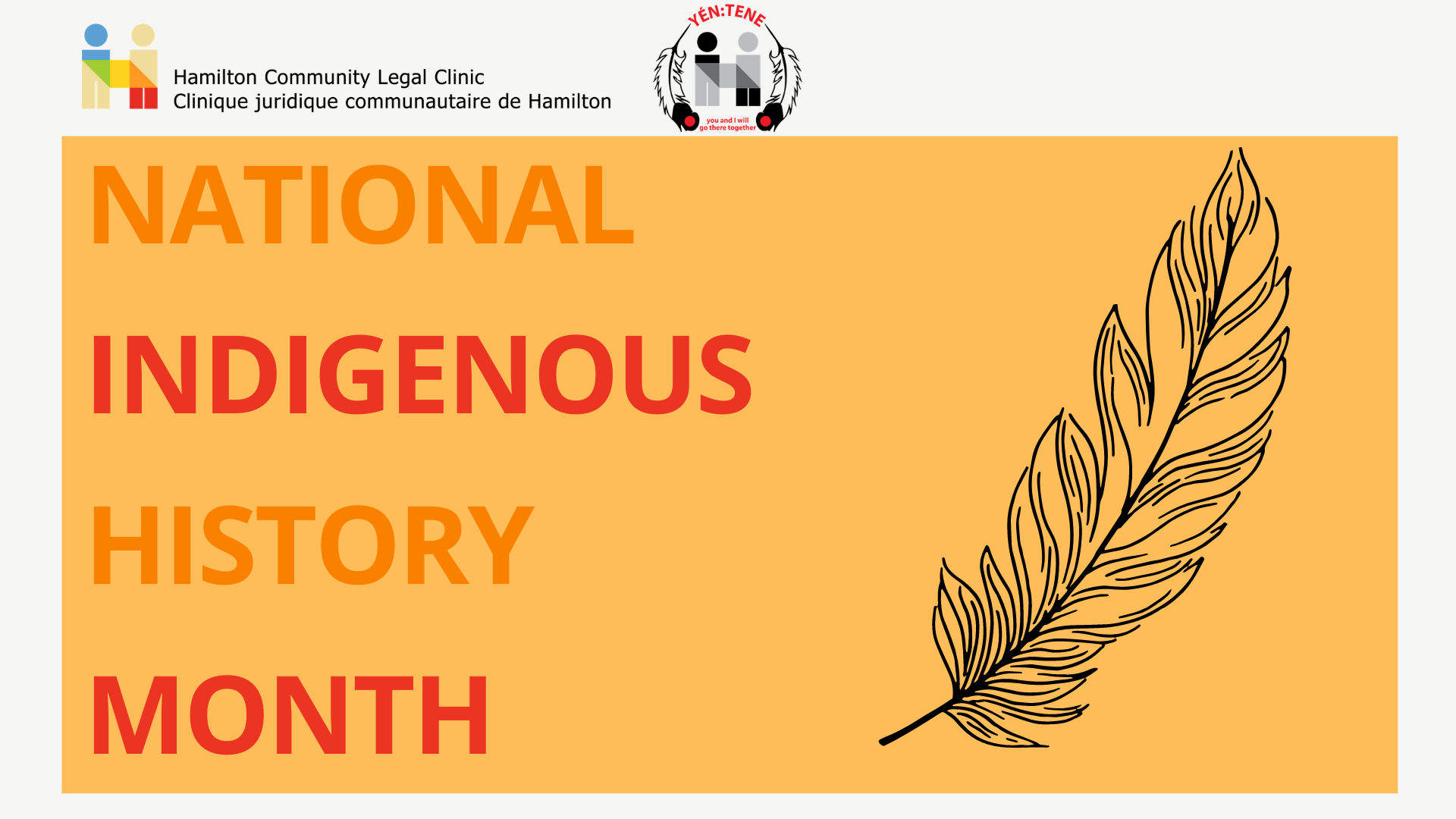
“ June is National Indigenous History Month – a time for all Canadians – Indigenous, non-Indigenous and newcomers – to reflect upon and learn the history, sacrifices, cultures, contributions, and strength of First Nations, Inuit and Metis people. It’s important to keep in mind that First Nations, Inuit and Métis Peoples each have their own unique histories. And within each group, there are distinct histories.” – Indigenous Corporate Training Inc.
The Hamilton Community Legal Clinic (HCLC) is committed to the Calls to Action and the Calls to Justice. “On May 24th 2016, the Hamilton Community Legal Clinic Board recognized National Aboriginal Day as a paid holiday, pursuant to Call to Action 80. The HCLC believes that National Aboriginal Day is an opportunity to expand awareness on Indigenous issues and promote inclusion. This decision represents the values of HCLC and its commitment to “reconciliAction”. The HCLC encourages both Indigenous and non-Indigenous organizations to consider doing likewise.” – A Journey to ReconiliAction – Calls to Action Report
Here’s the timeline on how Indigenous History Month came to be:
1982: The National Indian Brotherhood (now known as the Assembly of First Nations) called for the creation of a National Aboriginal Solidarity Day on June 21.
1990: The Quebec legislature recognized June 21 as a day to celebrate Aboriginal* culture
1995: The Royal Commission on Aboriginal Peoples recommended a day be designated as National First Peoples Day. The Sacred Assembly, a national conference of Aboriginal and non-Aboriginal people chaired by the late Elijah Harper, called for a national holiday to celebrate the contributions of Aboriginal Peoples in Canada.
1996: Governor General Romeo LeBlanc proclaimed that National Aboriginal Day would be celebrated June 21 each year. “On June 21st, this year and every year, Canada will honour the native peoples who first brought humanity to this great land,” said Leblanc. “And may the first peoples of our past always be full and proud partners in our future.”
2008: Prime Minister Harper offered the full apology on behalf of Canadians for the Indian Residential Schools system.
2009: By unanimous motion in Canada’s House of Commons, the month of June was declared National Aboriginal History Month.
2017: Prime Minister Justin Trudeau announced plans to change the name to National Indigenous History Month, reflecting a national and international preference for the term Indigenous, rather than Aboriginal.
If you are interested in learning more about the Indigenous history that was not taught in schools or if you want to learn about history from the Indigenous person’s point of view, there are lots of reports. Some are quite lengthy but well worth the effort.
Reports:
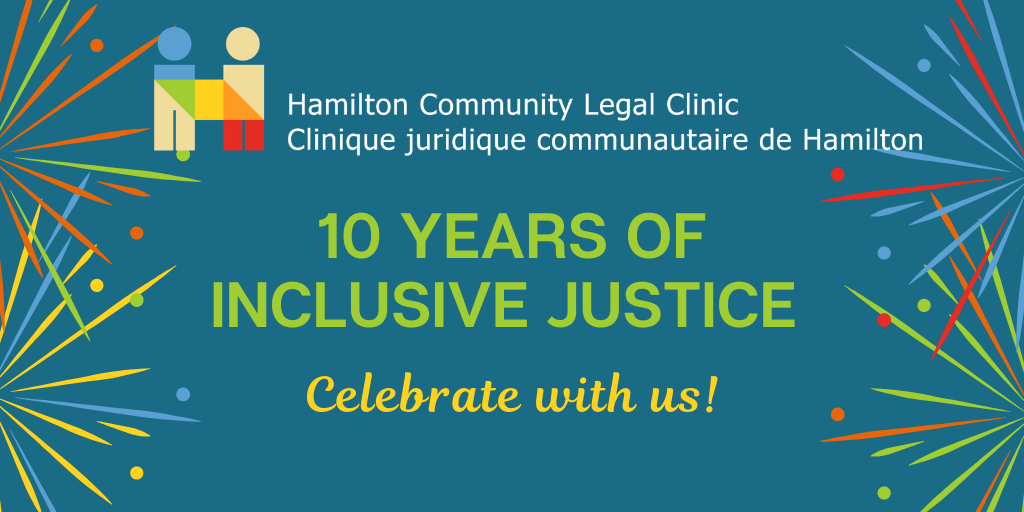
On April 1st, 2010, Hamilton Community Legal Clinic began operations after amalgamating Dundurn Community Legal Services, Hamilton Mountain Legal & Community Services and McQuesten Community Legal Services. It’s hard to believe that it’s been 10 years serving Hamilton as one clinic! We achieve positive changes and strengthen our community by promoting inclusive justice for vulnerable Hamilton residents. Our services aim to reach populations that have been disproportionately ignored and mistreated by our legal system.
Today, we are proud to say we have built relationships with many of these communities to deliver services and advocate for systemic change. We have done this by working within and with these communities. Although “celebrations” aren’t appropriate or indeed possible in these difficult times, we do wish to celebrate our commitment and actions to achieve inclusive justice. We also look forward to when we can celebrate together, by breaking bread and honouring each other and our stories and will do so as soon as it is safe to gather.
We are available to help by phone 905-527-4572 and online www.hamiltonjustice.ca/contact